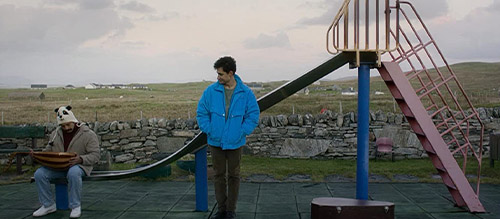Limbo (2020) BFI LFF Review
Limbo (2020)
Director: Ben Sharrock
Screenwriter: Ben Sharrock
Starring: Amir El-Masry, Kwabena Ansah, Ola Orebiyi, Vikash Bai, Grace Chilton, Kenneth Collard
Scotland through the eyes of a Syrian refugee is a bizarre and surrealist dreamscape, more fitting of an episode of ‘The Twilight Zone’ than a place to call home. At least, this is how Ben Sharrock captures his homeland in his second feature film, Limbo. In a gentle dance between deadpan humour and unbearable misery, we follow four refugees dumped on a lonely Scottish isle to await the processing of their visa applications – a process that drags on endlessly. Like fish out of water, the four men – who are already dealing with untold worries concerning the wellbeing of their homes and families – find themselves in a place where mustard is considered a risqué spice and anyone with so much as a tan falls victim to funny looks from the island’s witless inhabitants.
Despite being set in present-day Scotland, everything from interiors, wardrobe, colour palette and ignorant attitudes work to make the environment feel as if it has been lifted straight from the 70s British sitcom ‘Mind Your Language’. At the centre is a meditative young man named Omar (Amir El Masry), enduring a mind-boggling cultural awareness class as he attempts to assimilate to a seemingly cultureless culture. We watch open-mouthed alongside Omar and his classmates as two course leaders (played with wonderful wackiness by Grace Chilton and Kenneth Collard) gyrate erotically against one another before one takes a grope and the other delivers a swift slap; the lesson of the day being: Sex, Is A Smile an Invitation? Laced underneath the absurdity of this moment is Britain’s ill-hidden hostility towards foreigners – the ingrained hatred of those who assume refugees to be criminals and rapists rather than human beings in need of help. Sharrock uses this satirical, absurdist humour throughout, drawing a grim map of the refugee experience in the corners of Britain that are stuck firmly in the past.
As to exactly how Omar has washed up in this remote part of the country with a broken arm encased in a pink cast, Sharrock expands upon with only a lightness of touch. He tells us all we need to know through Omar’s dead-eyed stares and daily pilgrimages to a remote telephone box situated on a faraway boggy hill; the bleak glass box being his only tether to the life he has left behind. Emotionally charged phone calls reveal that Omar’s parents are in Turkey and that his beloved brother has returned to Syria to fight against Hamas. His Mother’s worried questions seem universal (‘are you okay? do you have enough money?’) but speak to an unknowable pain of a family ripped apart and strewn across continents. It would be understandable to approach a film such as this with a raised eyebrow, given that a refugee narrative written and directed by a white Brit sounds more like ‘Hell the Movie’ than a sage observation of a stranger in a strange land, but you’d be wrong to dismiss this work on scepticism; the film doesn’t attempt to offer any grand proclamations as to the complexities of war and humanitarian politics. The film rests its eye on an individual’s experience of Scotland, revealing the isolated purgatory of being misplaced in such a location.
If you didn’t laugh, you’d cry; so the four hapless friends fill up their time with pirated ‘Friends’ episodes and chicken theft to get through the long wet days that stretch out before them and into the unknown: the ‘we were on a break’ dispute transcends cultures. Farhad (Vikash Bhai), a Freddy Mercury superfan with whom Omar shares a room, is an odd source of cheerfulness despite having been stuck on the island for a long 32 months. And African refugees, Abedi (Kwabena Ansah) and Wasef (Ola Orebiyi), also offer comic relief in the form of exacerbated facial expressions and playful bickering. The group’s willingness to laugh and to make the most of their hopeless situation makes it all the more unbearable when they eventually reveal the tales of anguish which have led them to the barren, little island that they find themselves currently situated upon.
Knitted out in a goofy panda hat, Farhad persists in his attempts to become Omar’s friend: offering him both a shoulder to lean on and lessons in smizing (smiling with the eyes). He encourages Omar to play his oud (the bulky instrument which he carries around with him like an albatross around his neck), but Omar resists. ‘A musician who doesn’t play his instrument is dead’ Omar’s father warns, but Omar cannot bring himself to play. Instead, he uses the instrument as a physical reminder of the sins he believes himself guilty of, having left his family and his beloved Syria behind.
Amir El Masry, British-Egyptian rising star, gifts the film its tender heart. He expresses pain wordlessly; his homesickness palpable behind every blank and desperate stare. Not that his performance is entirely grief-stricken, he also delivers sharp wit, expressive joy, and silent longing. He comes alive most alongside Bhai; the pair bounce off one another with ease. In their sometimes heartfelt, sometimes bantering conversations, they deliver the biggest laughs and the harshest stings – a sorrowful discussion in a children’s play area is almost too much to handle.
Limbo looks at Scotland with the same contemporary yet loving eye that Marc Jenkins captured Cornwall with in his ground-breaking feature, Bait. In a boxy 4:3 format, Sharrock and his cinematographer Nick Cooke construct an exceptional portrait of an unforgiving yet arresting landscape. With sophisticated vision and stoic minimalism, they create a bittersweet tale for those in need of a place to call home.
21/24


